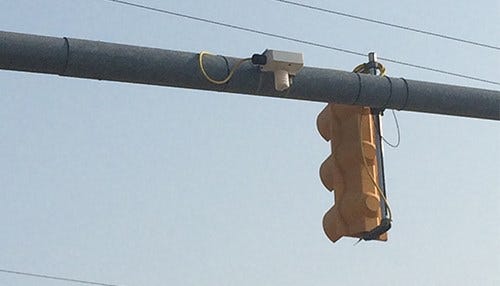South Bend Startup Focusing on Winter Road Treatment
 The sensor is installed near stop lights and uses optics to measure road temperature. (photo courtesy of Frost Control Systems)
The sensor is installed near stop lights and uses optics to measure road temperature. (photo courtesy of Frost Control Systems)
Subscriber Benefit
As a subscriber you can listen to articles at work, in the car, or while you work out. Subscribe NowA University of Notre Dame graduate is currently testing new technology aimed at helping cities more efficiently use salt to deal with snow and ice. Brad Tener is the founder and chief executive officer of Frost Control Systems LLC and has created a device that features a sensor to measure road temperatures in a more cost effective manner. He says the device eliminates costly components used in existing sensors and reduces the amount of technology required to process the data.
The idea for the device came from guidelines provided to airports and departments of transportation a decade ago for using road temperature data to regulate the use of salt which, in Indiana, led to a 40-percent reduction on material usage in the first year. Tener tells Inside INdiana Business he wondered why cities weren’t adopting that practice.
"It turns out, to get those road temperature measurements that you need to be able to use these guidelines, the equipment was extremely expensive. We’re talking $100,000 to $150,000 per location," said Tener. "That is far too expensive. When a city like South Bend needs between 30 and 40 sensors, you’re looking at $3 million or $4 million. It’s nowhere in the realm of cost effective for them or any other city."
Once a user knows the road temperatures, according to Tener, they can then determine what type of treatment to put on the roads to deal with its conditions.
The company began testing the devices in South Bend in 2017 and found they were more accurate and 90 percent less expensive than similar existing units. More testing is now being done in other markets in Nebraska and Michigan. He says they’re seeing similar results as the airports and highways and even better results in cities.
"A city environment is a lot more chaotic," said Tener. "There’s a lot of variance in the temperature of the roads across the city. You have the different material compositions: asphalt, concrete, pavers. You have different levels of traffic. You have different areas of the city; downtown is going to be very different than out on your rural countryside and still different from your residential neighborhoods. All of that contributes to this massive 5 to 20 degree range in your road temperatures across the city and by extension, when you know those road temperatures, you can properly de-ice your city based off of them."
Tener says the short-term goal for Frost Control Systems is to get the technology out to as many cities as possible. He says they already have a back list of cities who are interested in devices.
Tener says initially, the effort was self-funded but as he was looking to turn it into a business, he was able to secure a High-Potential Startup Grant from Indianapolis-based Elevate Ventures. Since then, the company has been operating on revenue generated from the paid trials of the device in the various test cities. He says the company hopes to finalize a $250,000 round of funding within the next few weeks, which would take the company through the beginning of 2020.
The company is also working on additional products, including a surface state sensor which could tell the user if pavement is wet, snowy, icy or under other conditions. Tener expects that product to be complete by the end of the year.
Tener says the long-term goal for the company is to commercially release its products in store parking lots.
Tener says he wondered why cities weren’t already using road temperature data in their treatment efforts.
